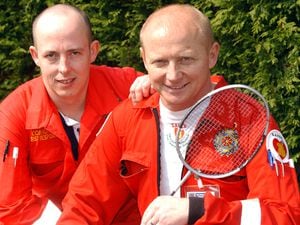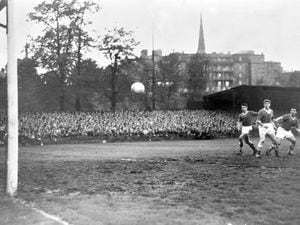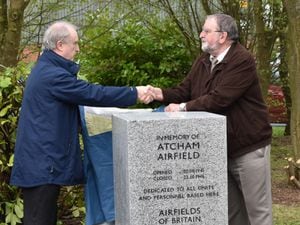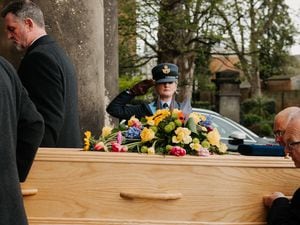Joan scores a century in an extraordinary life
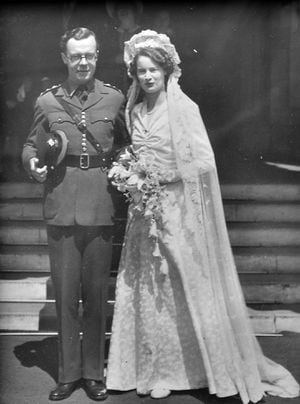
The lifetime’s CV of Lady Joan Dunn is remarkable and quite possibly unique.
She must be one of few people alive able to say they saw Hitler in the flesh, having spent a year in Nazi Germany as a teenager in 1935.
She was in the Strangers' Gallery to watch Prime Minister Neville Chamberlain give a "peace in our time" message to MPs in 1938.
During the war she worked in the top secret codebreaking centre at Bletchley Park and then for M16, and Kim Philby, whom she knew, worked in the next door room.
And these are just highlights from the early chapters in her long life.
She is now physically frail, but mentally sharp and full of fascinating anecdotes about her experiences.
It's now dinner time at her care home at Meole Brace, and her meal has already had to be returned to the oven once to keep warm, so it is time to conclude the interview and miss all the later chapters, covering another 70 years or so.
However we can skip to the very latest, because to bring that CV bang up to date she will celebrate her 100th birthday on March 7.
Not least among her achievements is that she has had four daughters, 16 grandchildren, and 31 great-grandchildren, with number 32 on the way - due in June.
She has known seven generations of her family.
"If anybody asked me the most amazing thing during the course of my life, I would say the man on the moon," she says.
She was born Joan Stafford King-Harman in London in 1918, during an air raid, according to family tradition. The family estate was at Rockingham in County Roscommon in the Irish Republic - the grand house burned down in 1957.
"I left school and got a thing called a School Certificate, and then went to Munich to continue my piano. I was really very keen, but I don't think I was all that good really," she said. She was also going to learn German.
"Of course Hitler was not considered to be any danger at that stage and this was a wonderful, happy year."
She was with other English girls at what she describes as a pre-finishing school. The year was 1935.
"Unity Mitford was out there at the same time, although I didn't meet her. We had tea at the Brown House at Munich, a rather upmarket tea house, which Hitler used to go to sometimes."
It should perhaps be mentioned here that the Brown House was the headquarters of the Nazi Party.
It was there, she says, that Unity Mitford and Hitler fell in love.
Joan saw Hitler several times.
"He used to go to the opera and always had the royal box in the Royal Opera House in Munich. When you went around you had to do the Hitler salute, but we all refused to do that."
This was early in the life of the Third Reich but there were already troubling signs, with young Joan seeing a large sign in a village saying, in German, Jews Not Wanted Here, seeing the Hitler Youth marching around, and hearing occasional stories of people disappearing in the middle of the night.
Nevertheless she says: "There was never any question of war or anything of that sort at that time. I came back madly pro-Hitler, thinking he had done a wonderful job for Germany, bringing them back from the horrors of the First World War. Of course my family were all pretty furious when I got back and thought I was a silly young girl."
Next stop was three months at finishing school in Paris, with much stricter chaperoning, to perfect her French and be immersed in more culture, opera, museums, and so on.
Returning to Britain, she was a debutante, which meant "coming out," the process in which upper class girls were introduced to the high society social scene.
"It doesn't mean what it means nowadays. It meant you were presented to the king or queen, which I missed because the old king died, so we were all in court mourning. There's a picture of me wearing a black dress. My sister was presented the following year.
"We went to a lot of parties and dances. There was Ascot, the Derby, Henley, and all sorts of things."
She was spending much time in this pre-war period staying at her grandmother's flat in Queen Anne's Mansions in Westminster. It was through her sister's godfather, the MP Sir Gilbert Acland-Troyte, a distant cousin, that she was able to watch proceedings in the House of Commons quite frequently and she was there when Neville Chamberlain reported to MPs on the infamous Munich Agreement with Hitler in 1938.
"I went up to the Strangers' Gallery, and I can see him now coming along, wiggling his way along the front bench in the Houses of Parliament waving this piece of paper saying 'peace in our time.'
"Whatever one thought about it then, even with hindsight it did buy him a year. It was not peace in our time, but it bought us a year."
Young Joan went on a secretarial course and with the coming of war, and friends getting jobs for the war effort, she worked for the ARP (Air Raid Precautions) and then got a letter which changed the course of her life.
"I got this letter out of the blue from 55 Broadway Buildings, asking whether I would be interested in a job in the Foreign Office. To cut a long story short I was interviewed and at the end they said you will do, would you like the job - it will be to do with passport control. They didn't say anything about what I would be doing."
It was in fact nothing to do with passport control. She had been headhunted and was about to plunge into the world of secret intelligence.
Turning up on the Monday morning as instructed with her suitcase, she was initially taken to Wormwood Scrubs prison, which was being used by MI5.
"We drove to Bletchley Park where I was told I would be a confidential secretary with languages and I would get 11 shillings a week, which was the same pay I think as a First Lieutenant was getting at the time. The government would pay for my billeting.
"Once I got into my office, they started explaining the work. I was not on the decoding side at all - my sister went into that. I was in the Secret Intelligence Service - Naval Intelligence Department 9. My boss was a very nice retired sailor called Captain Eddie Hastings."
They would receive the deciphered messages coming out of the decoding huts. Later in 1940 Joan was to move from naval intelligence to MI6 in St Albans.
Joan, who was a civilian, became head secretary and when her boss became ill took on his work for a while. She says she enjoyed the work.
"Partly it was because we felt we were doing something useful, and secondly because they were still expanding and they were always asking if you knew of anybody else who would like to come, and I was able gradually to call up quite a lot of friends, which was rather nice."
Kim Philby worked in the next room to her, in the Spanish section - years later Philby was revealed to have been in a KGB spy ring.
She would chat to him, and says he came across as very charming, but does not want to speak about him because "it's been written up too much."
There was of course tragedy with friends going to war and being killed, and her only brother, Thomas Stafford King-Harman, who was in the Irish Guards, was killed in Normandy in 1944 at the age of 22.
Of Hitler she says: "We couldn't hate him enough."
She never discussed her work with anybody, telling her parents that she was working for the Foreign Office.
Joan married Captain George Dennehy of the Irish Guards in 1943. Post-war he was a solicitor in the City.
Alas, our interview has to end but we can dip in to some details of her later life provided by daughter Caro Schiansky of Minsterley: "During the period of the 1960s to 1980s Joan volunteered tirelessly and worked as a school governor for the Oratory School and also for the Catholic Housing Aid Association.
"Joan and George loved to travel and hugely enjoyed going to the ballet and opera in London. Later Joan and George moved to Hampshire where Joan continued her voluntary work at the Basingstoke hospice and running the local Meals on Wheels service."
George died in 1990 and in 1997 Joan married Sir Robin Dunn, an old family friend and retired High Court judge. They were both 79. She moved to his home near Porlock, Somerset. Sir Robin died in 2014 and Joan then came to Maesbrook Care Home.
In the last few months Joan has been twice interviewed by a researcher for Bletchley Park, which is now a visitor attraction, to tap into her invaluable memories.
And in recognition of her service at Bletchley Park, she has received a commemorative badge issued by the government to the surviving veterans as recently as 2016, to which her reaction is perhaps rather unexpected.
"I think it's a waste of money."
Caro said: “As Joan’s youngest daughter I think my mother’s remarkable longevity is due to her lifelong interest in people and her ability to make connections with others, to network, and to maintain an amazing memory through reading and doing the Daily Telegraph crossword.”

